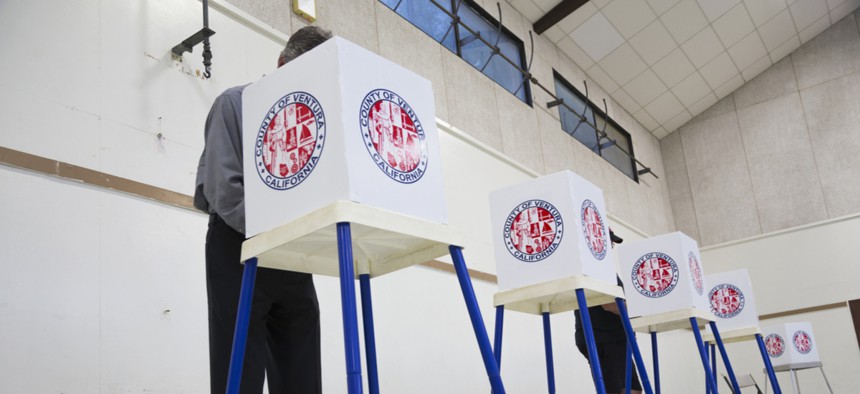Election Hacks: Sorting Fact from Fiction

Shutterstock

Connecting state and local government leaders
Elections expert David Becker explains that amid a national panic, "states and localities have been quietly working to assess election security in 2016 and improve the systems for 2018."
For the past year, the American electorate has been subjected to breathless headlines about the vulnerabilities of election technology.
Some have even implied the 2016 election was hacked, and that all Americans should be afraid—very afraid—of future hacks. But while this false hysteria has captured the media’s attention, election professionals in the states and localities have been quietly working to assess election security in 2016 and improve the systems for 2018.
In any analysis of the state of election security, we must start and end with facts and facts only. While often obscured in fear by companies looking to make a quick score, or hyper-partisans, or others with an agenda, here are the facts as we know them:
- There is zero evidence the vote tallies in 2016 were hacked. Approximately 75 percent of all ballots were cast on auditable paper, including the entire states of Colorado, Florida, Nevada, Ohio, Wisconsin and many others. And over half the states, including all of those listed here, conducted an audit of those ballots. In fact, independent researchers reviewed the ballots in Michigan and Wisconsin, and determined that “the tests uncovered nothing suspicious. That supports a conclusion that voting machines themselves were not hacked.”
- There were attempted hacks of the voter registration databases, with one confirmed, successful hack in Illinois, where approximately 70,000 voter records were accessed but none were altered or deleted.
- Other reports of “hacks” are unconfirmed at best or completely debunked. For instance, several news outlets alluded to a possible hack in North Carolina’s Durham County, which allegedly affected the electronic poll books in that county. In reality, an investigation found it likely that this incident was entirely attributable to human error and only affected a small number poll books countywide.
- But the threat is real. There is a consensus in the intelligence community that Russia, and perhaps others, attempted to interfere with our election and will likely do so again. That they weren’t able to alter vote tallies in 2016 doesn’t mean they won’t be successful in future elections.
Importantly, the continued interference of foreign actors is likely designed to reduce the faith Americans have in their election system. The good news is that there is widespread agreement about how to secure our systems:
- Auditable ballots: While more voters are voting on non-punch-card paper ballots than at any time in the modern era, we must move to the point where all voters have access to paper ballots. States like Louisiana are exercising real leadership to move in this direction, despite significant funding concerns.
- More and better audits: Again, more states than ever are auditing ballots to ensure that the voting machines accurately counted the ballots and did not experience any tampering. But slightly more than half the states isn’t enough. We must move to robust audits in all the states to ensure the technology is working as intended. States like Colorado are moving towards the gold standard of audits to ensure voter confidence.
- Better security training for election staff: Almost all states are considering better ways to train election staff to prevent and detect attacks like spear-phishing, and also moving toward two-factor authentication to make theft of sensitive credentials much more difficult.
And more progress has been made recently. The federal Election Assistance Commission and National Institute of Standards and Technology have led the way to establish new voting system standards that will likely go into full effect before the next federal election, paving the way for states requiring vendors provide fully auditable, secure, and accessible devices in the future.
There is still much more work to do, and election officials are meeting their responsibility head on. The biggest challenge right now is funding. This work is important, but it’s not free. Will the federal and state governments make the investments necessary to secure our democracy? There is reason for hope—there is a bill pending in Congress to provide grants to the states to help them pay for more security, and some states, like California, are considering actions to fully fund new, auditable, and secure systems. We should support these efforts as election officials seek to demonstrate to the electorate that we have taken action to restore their trust, and secure our election systems, so they can be assured that their votes matter, and will count.
David Becker is the executive director and founder of the Center for Election Innovation & Research, a non-profit that works to improve election administration through research, data, and technology. Prior to founding CEIR, David led Pew’s elections efforts for many years, and before that, served as a senior trial attorney with the Voting Section of the U.S. Department of Justice.

NEXT STORY: Time Is Running Out for the 370,000 Pregnant Women Who Get Health Care Through CHIP




